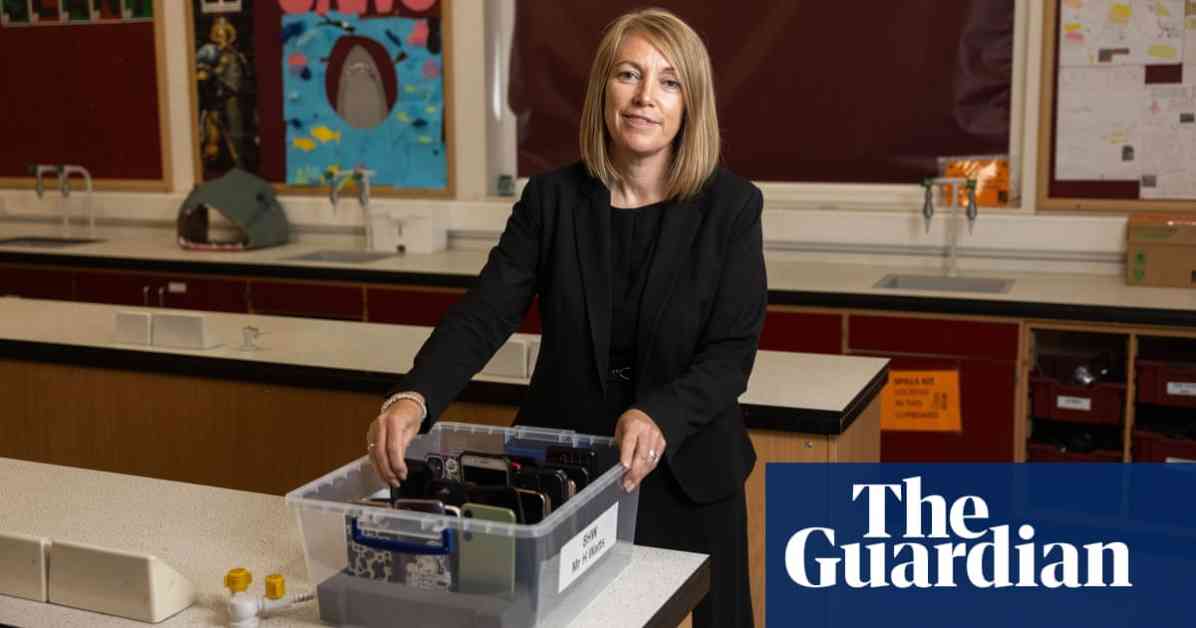Tenbury High Academy in the Worcestershire countryside is making headlines for its unique approach to teaching social skills to its secondary pupils. Principal Vicki Dean has implemented one of the toughest phone-free policies of any mainstream state secondary school in England. Visitors to the school often observe the students running around and playing instead of being glued to their phones, leading some to mistakenly assume that the pupils are less mature than their peers at other schools.
Dean emphasized the importance of allowing the students to engage in physical play and creative activities during their social time. She noted that the absence of phones as distractions has encouraged the pupils to participate in traditional games like chase, tag, and football. The school’s focus on “old-school playing” has not only fostered social interaction but also promoted creativity and physical activity among the students.
Despite the initial skepticism from some visitors, Dean believes that the students at Tenbury are not immature but simply learning to socialize in a different way. She highlighted the challenges faced by rural children who may not have the same opportunities for social interaction outside of school due to geographical isolation. As a result, the school has invested in equipment and sports clubs to keep the students engaged and entertained during social time.
The phone-free policy at Tenbury extends beyond just social time. Previously, students were allowed to use their phones before the start of school, but even that privilege has been revoked. Upon arrival, students are required to hand in their phones, which are securely stored until the end of the school day. This practice not only eliminates distractions during class but also ensures the safety of students who may need to communicate with their parents while traveling to and from school.
Arthur Hall, a year 11 student at Tenbury, expressed his support for the phone-handling policy, citing the security and peace of mind it provides. He noted that keeping phones locked away eliminates the temptation to check messages or notifications during the school day, ultimately reducing stress and improving focus. Hall’s classmate, Eddie Sheppard, echoed his sentiments, emphasizing the benefits of a phone-free environment in fostering a conducive learning atmosphere.
The success of Tenbury’s phone-free policy has caught the attention of other schools, including Cowes Enterprise College on the Isle of Wight. Principal Rachel Kitley revealed that she is considering implementing a similar policy in response to parental concerns about the negative impact of phones on students. A recent survey conducted by the college showed overwhelming support for stricter phone policies, with many parents citing concerns about online bullying, excessive screen time, and emotional dependency on phones.
Kitley shared a concerning incident where a student expressed distress at forgetting her phone, highlighting the emotional attachment and reliance that some students have on their devices. She emphasized the need for young people to develop self-discipline and emotional regulation, acknowledging the challenges of balancing technology use with academic and social responsibilities. Kitley’s observations underscore the growing recognition of the detrimental effects of excessive phone use on students’ well-being and academic performance.
While strict phone policies are essential for maintaining a focused learning environment, schools like Tenbury also recognize the need for flexibility in certain circumstances. Students with underlying medical conditions, such as type 1 diabetes, may require access to their phones for monitoring purposes. Sarah Hall, the mother of a year 8 student with diabetes, praised the school for accommodating her son’s medical needs while still enforcing the phone-free policy for other students. She noted the positive impact of limited phone use on her son’s focus and academic performance.
In conclusion, the innovative approach taken by schools like Tenbury High Academy in teaching social skills without phones highlights the importance of creating a balanced and conducive learning environment for students. By prioritizing physical play, social interaction, and creative activities, schools can help students develop essential social skills and emotional resilience. The success of phone-free policies in promoting focus, reducing distractions, and fostering a sense of community underscores the potential benefits of reevaluating the role of technology in education. As educators continue to navigate the challenges of integrating technology into the classroom, initiatives like the one at Tenbury offer valuable insights into creating a healthier and more inclusive learning environment for all students.

